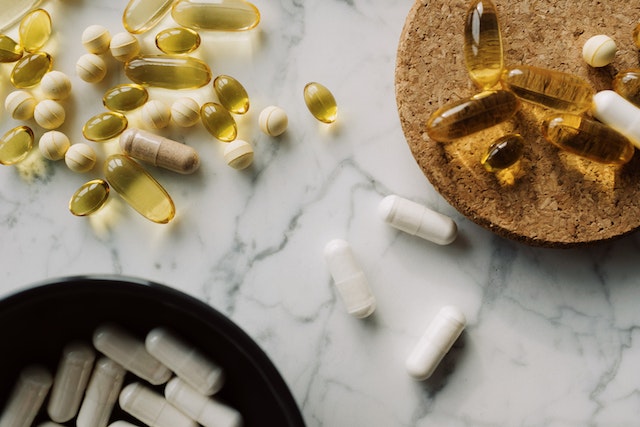

In the last post – Know your Macro & Micronutrients (Part – 1), we discussed macronutrients and why they are crucial; in this piece, we will discuss micronutrients and their significance.
What are Micronutrients?
Although the body only needs a small number of micronutrients, they are just as important as macronutrients since they are essential for healthy growth, illness prevention, and general well-being.
Micronutrients, often known as vitamins and minerals, are not produced by the body and therefore must be obtained externally from various dietary sources.
It is best to eat various foods to ensure enough vitamin and mineral consumption, as micronutrient deficiencies can have dire consequences.
Types of Micronutrients
There are four major types of vitamins and minerals that you should include in your diet.
Water-Soluble Vitamins
As the name suggests these vitamins dissolve in water and your body cannot store them easily. Any excess that is not quickly absorbed by the body is flushed out via urine.
They must be consumed regularly and are present in various plant and animal foods and dietary supplements.
Most water-soluble vitamins help convert food into energy by aiding enzymes.
Water-soluble Vitamins | Food Source Examples | Benefits | Few Symptoms of Deficiencies |
Vitamin B1 (thiamine) | Lentils, liver, peas, beans, sunflower seeds, brown rice, orange, and banana. | Conversion of food into energy, maintaining a healthy nervous system. | Loss of appetite, weight loss, poor memory, sleep disturbance, and fatigue. |
Vitamin B2 (riboflavin) | Milk, eggs, almonds, chicken, cheese, beef, broccoli, spinach, and salmon. | An essential component of intermediary metabolism, production, and maintenance of red blood cells and DNA. Is important for body growth. | Anemia, hair loss, skin disorder, poor appetite, and poor growth. |
Vitamin B3 (niacin) | Eggs, meats, fish, wheat flour, and richly colored vegetables. | Cell redox state maintenance, improves skin health and brain functions, and lowers bad LDL cholesterol. | Causes pellagra which is accompanied by insomnia, loss of appetite, weight loss, and soreness of mouth and tongue. |
Vitamin B5 (pantothenic acid) | Egg yolks, chicken, kidneys, mushrooms, and avocados. | Mental performance, production of red blood cells, making sex, and stress-related hormones in the adrenal glands. | Headaches, gastrointestinal problems, fatigue, and sleep disturbances. |
Vitamin B6 (pyridoxine) | Peanuts, soya beans, tuna, chickpeas, and potatoes. | Brain development during pregnancy and infancy, creates hemoglobin, creating neurotransmitters. | Anemia, a weak immune system, depression, skin rashes, and pain in hands and feet. |
Vitamin B7 (biotin) | Egg yolk, soybean, various ocean fish, and organ meats. | Building blocks of protein, extremely important for healthy skin, hair, and nails. | Hair loss (alopecia), conjunctivitis, visual and auditory loss. Biotin deficiency results in reproductive failure and impairs the growth and development of the fetus. |
Vitamin B9 (folate or folic acid) | Peas and nuts, kidney beans, asparagus, broccoli, and spinach. | DNA, RNA, red and white blood cells production and important during periods of rapid cell division and growth, such as in infancy and pregnancy. | Anemia, dermatitis, and impaired growth are the main symptoms of folate deficiency. |
Vitamin B12 (cobalamin) | Dairy products, meat, fish, and eggs. | DNA and red cell production, cell division, and maintain neurological function. | Anemia, appetite loss, neurological problems and dementia. |
Vitamin C (ascorbic acid) | Citrus fruits, potatoes, tomatoes, kale, spinach, peppers. | Repair of tissues, synthesis of protein, healing of wounds and forming scar tissues, repairing and maintaining cartilage, bones, and teeth. | Causes scurvy, dry and damaged skin, weak bones, painful joints, poor immunity and weight gain. |
Fat-Soluble Vitamins
These vitamins are found in lipid extracts of tissues and food and are only soluble in fat and not in water.
When the body doesn’t immediately require them, fat-soluble vitamins can be stored in the liver and fatty tissue and are absorbed through the stomach with the help of fat.
They can stay in your body’s fat for up to six months until your body requires them.
Fat-Soluble Vitamins | Food Source Examples | Benefits | Few Symptoms of Deficiencies |
Vitamin A | Red meat, milk, cheese, carrots, rich green vegetables, yellow fruits. | Maintaining healthy eyesight, maintaining healthy skin and teeth, promotes normal immune system function and aids cell differentiation. | Night blindness, frequent infections, slow bone growth, skin irritation, and infertility. |
Vitamin D | Salmon, mackerel, tuna, cod liver oil, red meat, egg yolks. | Maintain strong bones, help absorb calcium and phosphorus, support normal immune system function and boost mood. | Bone deformities in children and brittle bones in adults, hair loss depression, lower back pain, and weight gain. |
Vitamin E | Sunflower oil, olive oil, almonds, hazelnuts, avocado, mango. | Act as an antioxidant, protection of DNA, protection against viruses and bacteria, and help absorb vitamin K. | Fatigue and muscle weakness, vision problems, numbness and tingling in the arms and legs. |
Vitamin K | Green leafy vegetables, soybean, pumpkin, pickles, blueberries. | Prevents blood clotting, healthy bones, healthy heart. | Excessive bleeding from cuts and wounds, easy bruising, heavy and painful menstruation, bleeding gums. |
Macrominerals
These minerals are needed by the body in large amounts. They are crucial for a variety of physiological processes, as well as for healthy development and growth.
Macrominerals | Food source Examples | Benefits | Few Symptoms of Deficiencies |
Calcium | Milk, yogurt, cheese, salmon, beans, lentils, almonds, dried figs. | Maintain strong bones, healthy teeth, balances pH levels, maintain weight, lowers indigestion. | Muscle cramps (back and legs), dry skin, brittle bones, tooth decay, tingling sensation (lips, fingers, and feet), muscle spasms, depression, confusion. |
Phosphorus | Chicken, seafood, dairy, oatmeal, quinoa, pumpkin seeds, yogurt, beans, lentils | Regulates heartbeat, removing waste from kidneys, healthy nerve conduction, muscle recovery after exercise, healthy bone and teeth | Muscle weakness, bone pain, poor appetite, anxiety, stiff joints, breathing problems, weakness |
Magnesium | Avocados, bananas, leafy greens, dark chocolate, peanuts, flaxseeds, legumes. | Maintain blood sugar and blood pressure, healthy bones, protein production, supports muscle and nerve functions, promotes sound sleep, beautiful skin. | Loss of appetite, nausea, muscle weakness, personality change, irregular heartbeat, muscle cramps. |
Potassium | Bananas, avocados, sweet potatoes, potatoes, fish, beets, beans, legumes. | Bone and muscle maintenance, healthy kidneys, helps regulate water in body, control blood pressure. | Heart palpitation, bloating, constipation, abdominal cramps, weak muscles, muscle cramps, nausea, vomiting, depression. |
Trace Minerals
Trace minerals are the extremely minute levels of minerals found in living tissues.
Trace minerals are important for vital biological functions and a trace mineral deficiency may be just as harmful to your health as a major mineral deficiency.
The body requires trace minerals in smaller amounts, specifically 100 milligrams or less.
Trace Minerals | Food source Examples | Benefits | Few Symptoms of Deficiencies |
Iron | Red meat, chicken, eggs, tuna, mackerel, spinach, broccoli, dates, figs, lentils. | Maintaining good energy levels, reduces fatigue, improves focus, regulates body temperature, assists healthy pregnancy, improves physical performance. | Pale skin, hair loss, dry skin, headaches, lack of concentration, weakness, fatigue, dizziness, headaches. |
Manganese | Black tea, spinach, pineapple, oatmeal, hazelnuts, shellfish, blackpepper. | Helps in fat and carbohydrate metabolism, helps blood sugar regulation, improve bone health, strong antioxidant, improves brain function, aids wound healing. | Defective insulin production, low fertility, weaker bones, weakness, skeletal defects. |
Copper | Oysters, liver, mushrooms, cashews, leafy greens, sweet potatoes, dark chocolate, avocados. | Healthy immune system and nerve cells, protect cell damage and DNA, maintenance of skin and hair pigmentation. | Bone loss, thyroid problems, high cholesterol, increased risk of infections, irregular heartbeat, loss of hair and skin pigment. |
Zinc | Oysters, beef, chickpeas, cashews, oats, mushrooms, dark chocolate. | Enzyme function, child growth, healthy skin, reduce inflammation, healthy testosterone hormone levels, vital for protein synthesis. | Appetite loss, hair loss, changes in taste, fertility problems, eye and skin problems. |
Iodine | Iodized salt, fish, eggs, chicken, dairy products, seaweed. | Promoting thyroid health, neurodevelopment during pregnancy, imrove cognitive function. | Weight gain, sensitivity to cold, constipation, dry skin,thinning hair, learning difficulties. |
Selenium | Fish, chicken, eggs, mushrooms, spinach, lentils, cashews, bananas. | Powerful antioxidant, boost fertility, lower risk of cancer, better cardiovascular health, DNA synthesis. | Foggy mental state, hair loss, infertility, muscle weakness, weak immune system. |
Take away message for Micronutrients
Micronutrients, often known as vitamins and minerals, are nutrients that the body needs in extremely small amounts.
They can be obtained via supplements as well as a broad variety of food sources and play an important role in enabling our bodies to work effectively.
Micronutrient supplements should not be used as a replacement for a well-balanced diet.
Before using any micronutrient supplements, see a health care professional since excess of any micronutrients in the body can create toxicity and severe health issues.
